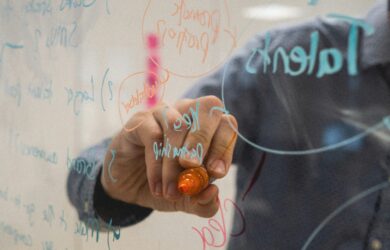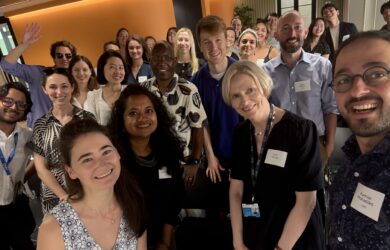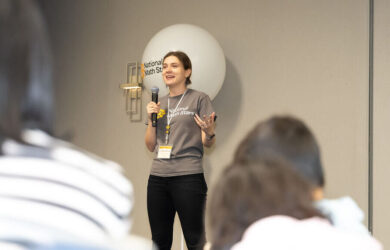
Diana Pirjol talks to Gates Cambridge about her next generation data analytics and data science company which aims to bring better decision-making to all.
We started as an international team of friends who met either at Cambridge University or in Washington D.C. Our passion for health and our desire to make a positive transformation in the world brought us together.
Diana Pirjol
Diana Pirjol [2011], did her MPhil in Public Health and is now Executive Director of the Human Data Insight (HDI) Group, a next generation of data analytics and data science company with a social mission to provide organisations with affordable and high quality consulting services and support the development of next generation social entrepreneurs. She spoke to Gates Cambridge about her work.
Q: What does your company do?
Diana Pirjol: Along with a multi-disciplinary team of experts, we are turning the way organisations which are active in the healthcare and pharmaceutical field generate and use their data to optimise their operations. Whereas clients have focused on asking what data can be generated and can this help us optimise their operations, we ask them what data and processes they already have and how we can leverage it to reduce costs and maximise performance.
Our findings indicate that most of the processes used so far are not automated, integrated, synchronised or linked to performance indicators. Furthermore, we have noticed a tremendous potential for impact and performance evaluations in countries such as Romania, where there is often limited evidence on the impact of projects funded.
At HDI Group, we are engineering how organisations can use their resources to generate evidence that will ultimately lead to a more informed decision-making process. With our solutions, we can lower the barriers for organisations to optimise their operations so they can impact millions of lives. At HDI Group, we believe that all socially mindful organisations deserve to be helped even if their financial resources are limited.
Q: How do you do this?
DP: We are scaling up the potential of organisations to use their existing data sources by integrating, optimising and building pre-trained models, data sets and solutions that can help organisations solve the most demanding challenges promptly. We do not stop here as we understand that client needs are more complex, and as a result, we offer a 360-degree perspective to their challenges. We work with clients from the early stages of product/service concept development to launch strategy, commercialisation and lifecycle management. Our services fall into four major categories: strategy consulting, operational optimisation, data analytics & benchmarking and IT integration and digitalisation.
Q: How did you start?
DP: We started as an international team of friends who met either at Cambridge University or in Washington D.C. at the World Bank Headquarters between 2012 and 2015. Our passion for health and our desire to make a positive transformation in the world brought us together.
We realised we have the know-how and the resources to set up the company. Our most important resource, our experts, have obtained their MPhils, PhDs or MD degrees at the top 10 universities worldwide, the majority coming at the University of Cambridge. Their combination of expertise is unique as it brings together experts in data science/ engineering, health economists, managers in health, epidemiologists and behavioural scientists. We have the perfect combination of computational, operational and strategy experience.
In terms of resources, we stand out from our competitors in 10 main ways, which gives us the possibility to bringing value to specific projects. For instance, we deploy our in-house field and off-site agency for collecting and analysing data; we have access to vast information in the scientific literature and have established strategic partnerships with public/private hospitals and other institutions to enhance our access to proprietary databases; we make us of our advanced analytical tools and set up strategic partnerships with Microsoft and John Snow Labs to provide the technology clients are looking for; and we have high quality relationships with physicians, medical colleges, patient organisations, key opinion leaders, investment funds and pharmacists in local markets.
We also partner with top technology companies and leading universities, including Erasmus for Young Entrepreneurs, University of Cambridge, Microsoft, John Snow Labs, Goldman School of Public Policy and Esade at Ramon Llull University.
Together we have carried out significant projects for the UNICEF, the Centers for Disease Control and Prevention, the World Bank, major pharmaceutical companies and NGOs and we are in discussions with other key stakeholders.
Q: Have you worked with any other Gates Cambridge Scholars?
DP: We have been receiving ongoing business mentoring and have sought advice from other Gates Cambridge scholars, including Anastasiia Kamenska [2010], a strategy project manager at Novartis, David Bard [2003], a managing director at The Halifax Group, and Alex Davies [2010], a machine learning expert. Gates Cambridge was very, very important for me. It helped me reach out to experts and engage them in our projects. It also exposed me to what other people in different disciplines were doing. I learned from them, and it introduced me to a more entrepreneurial mindset.
*If you have experience in any of the above areas and are interested in joining the team to participate in business development or project implementation, please get in touch with Diana at dpirjol@hdigr.com. More information about the company can be found here.












